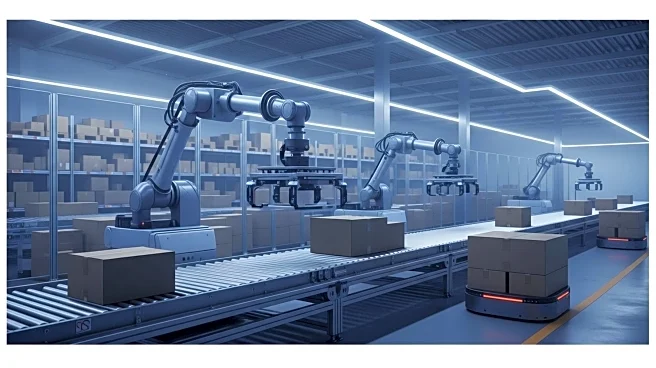What is the story about?
What's Happening?
The article explores the evolution of warehouse management systems (WMS) as they become central to supply chain execution. Modern WMS solutions are transforming from basic transaction recorders to comprehensive systems that integrate multiple operations, including transportation, labor management, and automation. The article highlights insights from industry leaders like Smitha Raphael of Synergy Logistics and Bryan Batchelder of Datex, who discuss the importance of WMS in providing a big-picture view of supply chain activities. The integration of AI and automation in WMS is also emphasized, with companies like Made4net and SnapFulfil offering solutions that enhance efficiency and reduce errors. The article underscores the need for WMS to be adaptable and scalable to support future growth and technological advancements.
Why It's Important?
The transformation of warehouse management systems is critical for businesses seeking to enhance supply chain efficiency and meet rising customer expectations. As supply chains become more complex, the ability to integrate various operations through a single WMS platform offers significant advantages. This integration allows for better visibility, coordination, and decision-making across the supply chain. The adoption of AI and automation in WMS further enhances these capabilities, enabling businesses to optimize labor productivity, reduce errors, and improve order fulfillment. As companies face challenges like labor shortages and increasing service demands, investing in advanced WMS technology can provide a competitive edge and drive long-term success.
What's Next?
As the demand for efficient supply chain operations grows, more companies are likely to invest in advanced warehouse management systems. The integration of AI and automation in WMS will continue to evolve, offering new opportunities for optimization and cost savings. Businesses may also explore partnerships with WMS providers to customize solutions that meet their specific needs. As technology advances, the role of WMS in the supply chain will become increasingly strategic, with WMS playing a central role in driving efficiency and resilience. Companies that adopt these technologies early may gain a competitive edge in the market.
Beyond the Headlines
The shift towards advanced warehouse management systems reflects a broader trend of digital transformation in the supply chain industry. As businesses seek to enhance efficiency and reduce costs, the integration of technology across all aspects of the supply chain becomes essential. This transformation also raises ethical and legal considerations, such as data privacy and the impact of automation on the workforce. Companies must navigate these challenges while leveraging technology to drive innovation and growth. The long-term implications of this shift could include changes in workforce dynamics and the emergence of new business models focused on technology-driven supply chain solutions.
















